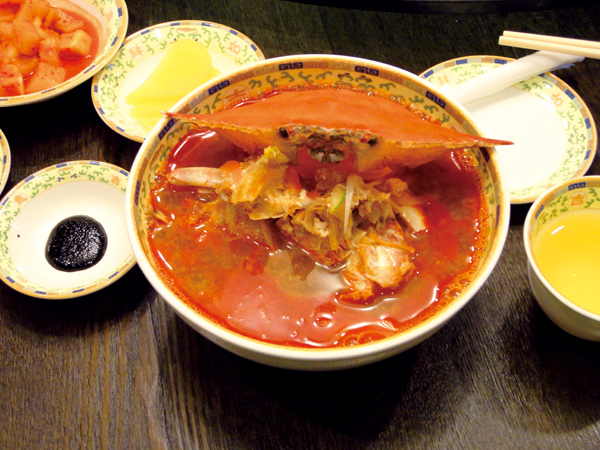
- Updated 2024.4.24 17:16
- All Articles
-
member
icon
-
facebook
cursor
-
twitter
cursor
|
TravelThings To Do |
A little taste of Taiwan in JejuDeok Seong Won restaurant: 'A garden filled with goodness' |
|
| |
 |
|
| ▲ Spicy crab jjambbong. Photo by Kimberly Comeau |
When I first stepped into the Deok Seong Won restaurant, the deep smell of rustic wood filled my senses. The sign above the restaurant welcomed us with Chinese characters that directly translate to goodness (deok), growing and prosperity (seong), and garden (won). In Chinese this phrase means “A garden filled with goodness.” The restaurant is clean and bright, with plants and flowers creating an atmosphere with a distinct Asian flair, adding to its overall charm.
The restaurant has a wonderful view overlooking the ocean at Seogwipo, and from afar you can see the International Convention Center and The Museum of African Art. For tourists especially, this is an amazing location for a memorable meal. For diners looking for some fresh air with their dinner, clean and comfortable seating is available outside on the deck, allowing for a full horizon view of Jungmun.
The menu is tailored to tourists, providing English, Korean and Chinese translations of the dishes. Some of the more popular ones are jjambbong (spicy red pepper soup with noodles) with seafood or crab, jajangmyeon (noodles served with black bean sauce) and tangsuyuk — known in Western parts of the world as sweet and sour pork (tang meaning sugar, su is vinegar and yuk, pork). Specialty dishes are also offered. I had the crab jjambbong and tangsuyuk and they were delicious! All ingredients served at Deok Seong Won come from Jeju except for the crab which comes from Busan.
I was greeted by the owner, Wang Yu Kuang, with a great big smile and warm eyes. Because it is a Chinese restaurant, my first question was if he was Chinese. And that is when the story began...
Wang’s grandfather was a businessman from Taiwan who came to Jeju in 1948 during the political upheaval in China. Just three years earlier Japan had surrendered to the allied forces at the conclusion of World War II. It was also in 1948 that nationalist leader Chiang Kai Shek was inaugurated as the first president of the newly formed Republic of China.
Wang’s grandfather, along with his Japanese wife (whom he had met near Shanghai), established his restaurant in Gimnyeong upon arrival in Jeju. By 1950 he was unable, because of the turmoil in Taiwan, to return to the place of his birth. After about three years he moved his business to Seogwipo City, betting that it would be a better location. His wager paid off. The restaurant is still in Seogwipo today, and business is better than ever. His son, Wang Yu Kuang’s father, eventually took over the restaurant, and today he owns and runs it.
The Deok Seong Won Restaurant in Jungmun is notably different from the restaurant in Seogwipo City — and this is no coincidence. Wang Yu Kuang told me that while growing up, he saw his mother and father working day and night in the restaurant.
As a young man he also worked there and remembers those times as being nothing but hard work. He took some time off to travel the world, visiting New Zealand among other places. During these travels he came to see “how precious life is and that working hard is good but working too hard is not living life to the fullest,” he said. So in 2003, when he came back to Jeju to start his own restaurant, what was most important to him was to create a casual, more laid back version of his grandfather’s original establishment.
The atmosphere looks and feels different, and although many of the same dishes are served, the recipes do differ slightly. Everyday, between 3 p.m. and 5 p.m. the restaurant closes so the staff can regroup and prepare for the next meal. This ensures high quality food and superb customer service as well as giving the employees a breather.
I also had the opportunity to sample a few teas at the restaurant. My particular favorite was Oolong. This, and all of the other teas served are imported directly from Taiwan.
Owner Wang, who can speak Mandarin Chinese, Japanese, English, Korean, and Jeju dialect, said he would someday like to own a smaller restaurant and see it so busy that getting a table will only be possible with a reservation.
Deok Seong Won
2446-1 Jungmun-dong, Seogwipo City
Tel: 064-738-0750
Hours: 11 a.m. to 9 p.m. (the restaurant closes between 3 p.m. and 5 p.m.)
(Interpretation by Kim Jung Lim)
|
|
|
|
|
|
|
|
ⓒ Jeju Weekly 2009 (http://www.jejuweekly.net)
All materials on this site are protected under the Korean Copyright Law and may not be reproduced, distributed, transmitted, displayed, published without the prior consent of Jeju Weekly. |
|
|
|
|
| Jeju-Asia's No.1 for Cruise |
|
|
|
Title:The jeju Weekly(제주위클리) | Mail to editor@jejuweekly.net | Phone: +82-64-724-7776 Fax: +82-64-724-7796
#503, 36-1, Seogwang-ro, Jeju-si, Jeju-do, Korea, 63148
Registration Number: Jeju, Ah01158(제주,아01158) | Date of Registration: November 10,2022 | Publisher&Editor : Hee Tak Ko | Youth policy: Hee Tak Ko
Copyright ⓒ 2009 All materials on this site are protected under the Korean Copyright Law and may not be reproduced, distributed, transmitted, displayed, published
without the prior consent of jeju weekly.com.

|




















